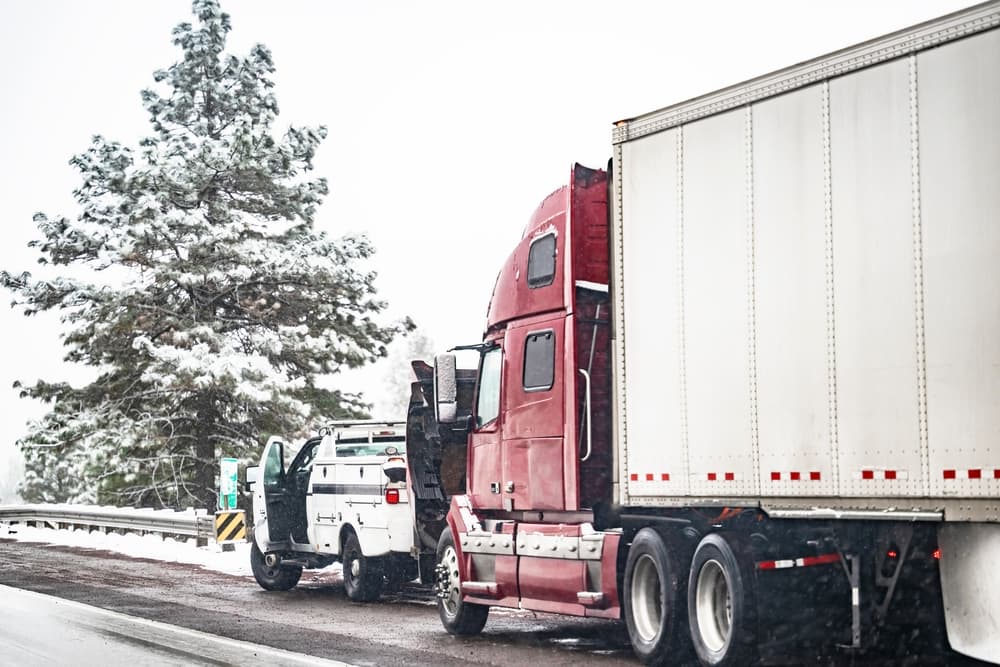Truck accidents, particularly those resulting in fatalities, often dominate headlines and public discussions due to their severe impacts on victims and their families. A common assumption in such cases is that the truck driver is invariably at fault. However, the reality is far more complex.
If you’ve lost a loved one in a truck accident, discuss your case with a skilled truck accident attorney in Tampa. A lawyer can investigate the matter to determine whether the truck driver or another party is to blame for the collision and fatality. Being armed with this information can help ensure you pursue justice from the appropriate party and get the financial recovery you deserve.
The Complexities of Fault for Truck Crashes
Truck accident cases are complex for many reasons. One of the most significant issues is determining fault.
In some cases, the cause of a trucking collision is straightforward, and liability can easily be determined. But in many other cases, figuring out how a truck accident happened and who is to blame is anything but simple.
Many things are likely to go wrong when a commercial vehicle is on the road. Therefore, it is not uncommon for multiple parties to share fault when an accident occurs. While the truck driver may be included in the list of responsible parties, depending on the root cause, the collision may have been out of their hands.
Pinpointing who is at fault for a truck crash usually involves an in-depth investigation. It’s best to have an attorney take on the case to get the answers you need.
Understanding Truck Accident Liability
Trucking collisions involve a range of scenarios and variables. The potential for catastrophic outcomes is significant, given the size and weight of commercial trucks compared to passenger vehicles. When a fatal accident occurs, the immediate inclination might be to hold the truck driver responsible. While drivers often play a central role, numerous parties and factors may contribute to trucking accidents, including the following.
Driver Conduct and Behavior
Driver negligence is a primary factor in many trucking accidents. It includes:

- Speeding
- Driving under the influence of drugs or alcohol
- Running stop signs and red lights
- Following too closely
- Distracted driving
- Unsafe lane changes and turns
- Aggressive driving
Establishing negligence requires a thorough investigation into the driver’s behavior at the time of the accident.
Along with driver conduct, fatigue is an important detail to consider. Truck drivers often deal with extreme fatigue due to the nature of their jobs. The Federal Motor Carrier Safety Administration (FMCSA) regulates truck drivers’ service hours to combat fatigue. Violations of these regulations can lead to accidents. Still, proving fatigue as a factor requires detailed evidence, and even then, the issue might be attributed to broader systemic problems rather than individual negligence.
Vehicle Maintenance and Mechanical Failures
Federal regulations require trucks to undergo regular inspections, maintenance, and repairs. Failure to follow these regulations can have serious consequences.
Mechanical failures, such as brake malfunctions or tire blowouts, can lead to collisions. Responsibility for maintenance typically falls on the trucking company. The company might share or assume full liability if a failure is due to a lack of proper maintenance.
Regular inspections and maintenance records play a key role in determining faults. If the trucking company neglects these duties, liability may extend to the trucking company rather than the driver.
Truck Company Policies and Practices
If a trucking company hires drivers with a history of unsafe driving or inadequate qualifications, it might be liable for negligence in hiring. Companies are also responsible for providing adequate training and supervision. Inadequate training can lead to collisions, shifting some blame to the employer.
Cargo Loading and Management
How cargo is loaded and secured in a truck can impact a driver’s experience on the road. When improperly loaded or secured, cargo can shift while in transit. If cargo begins to move around uncontrollably, this can cause the truck driver to lose control of the truck and cause a severe collision.
When cargo issues cause a trucking accident, the party responsible for cargo loading and management is usually to blame.
Road Conditions and Environmental Factors
Adverse weather conditions like rain, snow, or fog can contribute to accidents. While truck drivers are expected to adjust their driving to these conditions, poor road maintenance or insufficient warning signs might also be a factor.
Poor road design or lack of proper signage can also contribute to truck crashes. In such cases, liability might extend to governmental or municipal bodies responsible for road upkeep.
Product Liability
Product designers, manufacturers, or distributors might share liability if a defect or malfunction contributes to a fatal trucking accident. This is particularly relevant if the defect could not have been identified during regular maintenance checks. When this occurs, the trucking company might not share any responsibility, and fault may lie solely with the parties responsible for design, production, and distribution.
Evidence to Establish Liability for a Fatal Trucking Collision
Evidence regularly plays a large role in truck accident cases. Not only can evidence prove the cause of the collision, but it can also help determine who is responsible for the crash.
For truck accident cases, establishing liability requires thoroughly examining various types of evidence. Some of the critical pieces of evidence that can provide much-needed answers and prove fault include:
- Police reports: These reports provide an official account of the accident, including details about the scene, any citations issued, and statements from drivers and witnesses. They often include a determination of fault or preliminary findings.
- Witness statements: Statements from people who saw the collision can provide an unbiased perspective on what happened and help corroborate or dispute the accounts of those involved.
- Driver logs and records: For commercial trucks, the driver’s logs, records of hours worked, and rest periods can be vital. They help determine whether the driver adhered to driving time and other regulations.
- Vehicle maintenance records: Regular maintenance and repair records for the truck can show whether mechanical issues might have contributed to the accident.
- Black box data: Many commercial trucks are equipped with event data recorders (black boxes) that can provide information on the truck’s speed, braking patterns, and other operational data leading up to the collision.
- Photographs and videos: Photos and videos of the accident scene, vehicle damage, and any relevant road conditions can be valuable in understanding the impact and positioning of the vehicles involved.
- Traffic camera footage: If the accident occurred in an area with traffic cameras, footage can provide a clear view of the crash, helping to establish how it happened.
- Expert testimonies: Experts in accident reconstruction can analyze the evidence and provide opinions on how the accident occurred and who might be at fault. They can offer insights into vehicle dynamics, road conditions, and other technical aspects.
Every truck accident is unique, so the relevance and weight of these pieces of evidence can vary. Still, strong evidence can significantly help prove how a trucking collision occurred and who is liable for the fatality.
Pursuing Compensation Following a Fatal Truck Accident
In a recent year, 5,837 individuals lost their lives in commercial truck collisions. If a loved one has died in a trucking accident, you may have legal options to pursue justice. The path forward depends on the circumstances.
In some situations, you can file insurance claims with insured at-fault parties. Because of their size, weight, and capacity to cause much injury and destruction, trucks are often covered by large insurance policies. Based on fault for the collision, you can file an insurance claim to seek fair compensation. A wrongful death attorney can assist with your insurance claim, as insurance companies are difficult to deal with.
Depending on the outcome of your insurance claim or the details of the case, you may need to file a wrongful death lawsuit. A wrongful death lawsuit is a legal claim brought by the survivors of a deceased victim who has died due to the negligent, reckless, or intentional actions of another party. By filing a wrongful death lawsuit, you can continue your pursuit of justice and financial recovery.
Damages Available for Fatal Trucking Crashes
After losing a loved one at the hands of another, you may seek monetary damages to compensate you for your losses and suffering. The damages awarded in these cases depend on the situation’s specifics and the jurisdiction but can include various economic and non-economic damages.
Economic damages compensate for measurable financial losses resulting from the death. They include:
- Medical expenses: The costs of medical treatment received by the victim before their passing, including hospital bills, surgeries, and medications.
- Funeral and burial expenses: Costs related to the victim’s funeral, burial, or cremation.
- Lost income and earnings: Compensation for the income the victim would have earned if they had lived, including income, salaries, bonuses, and benefits.
- Loss of financial support: The future financial support and services the victim would have provided their dependents, such as care, household duties, and financial contributions.
Non-economic damages, on the other hand, compensate for more subjective losses that are not easily quantifiable. They can include:
- Pain and suffering: This includes the emotional distress and suffering experienced by survivors due to the death. It reflects the pain and mental anguish caused by the untimely loss of a loved one.
- Loss of companionship: Compensation for the emotional impact and loss of the victim’s companionship, affection, and relationship with their survivors.
Depending on the cause of the collision and the level of wrongdoing, some cases also qualify for punitive damages. These damages are granted in cases where the defendant’s actions are grossly negligent, malicious, or intentional as a way to punish and deter future actors from acting in a similar manner.
Legal Time Limits and How They Impact Your Case
After the death of a loved one, you may have the opportunity to take legal action. However, you only have a short amount of time to do so.

Statutes of limitations are laws that limit the time plaintiffs have to file their lawsuits in court. For wrongful death cases, statutes of limitations are fairly short, only allowing one to three years to file a claim. Failing to file your lawsuit on time can cause you to lose your right to pursue justice and compensation from the at-fault party.
Wrongful death situations are unique to other types of personal injury cases, as there is a tragic loss. While it’s understandable to need some time to cope with your loved one’s passing, it’s also important to keep the ticking clock in mind. Therefore, it’s best to consult with a wrongful death attorney as soon as possible after the death.
While you do have some time to file your lawsuit, there are usually several pre-lawsuit steps to complete. Hiring legal representation early on allows the truck accident lawyer time to properly handle your claim and limit potential errors or missed deadlines.
A Wrongful Death Attorney Can Determine Fault After a Fatal Trucking Accident
The assumption that a truck driver is always to blame in a fatal trucking accident oversimplifies the complexities involved in these cases. While driver negligence is a significant factor, other elements, such as company practices, vehicle maintenance, and road conditions, can also play major roles.
If you’ve lost a loved one in a trucking collision, seek help from an experienced wrongful death attorney. Wrongful death cases can be challenging, but a personal injury lawyer can handle all case-related tasks, from investigations to negotiations and everything in between.
Among the most important tasks involved with your case is determining fault. Your wrongful death attorney can ensure all responsible parties are identified and held accountable for the wrongdoing.
Getting justice for a death cannot undo the past, but it can help move forward. Don't hesitate to reach out to a wrongful death attorney who is skilled in truck accident cases to discuss your options and find the closure you deserve. Consult with a wrongful death attorney concerning your loved one’s fatal trucking accident to begin working on your case.
We proudly serve Hillsborough County, Pinellas County, Pasco County, Polk County, and its surrounding areas in Florida:
Apex Law Firm - Tampa Office
412 E Madison St Suite 1206, Tampa, FL 33602
(813) 444-5212


